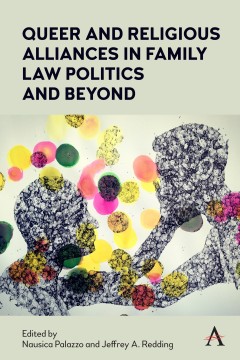Queer and Religious Alliances in Family Law Politics and Beyond
Edited by Nausica Palazzo & Jeffrey A. Redding
- About This Book
- Reviews
- Author Information
- Series
- Table of Contents
- Links
- Podcasts
About This Book
Family law is a site of social conflict and the erasure of non-traditional families. This book explores how conservative religious and progressive queer groups can cooperatively work together to expand family law’s recognition beyond the traditional state-sponsored family. Various religious groups have shown an interest in promoting alternative family structures.
For example, certain Muslim and Mormon communities have advocated for polygamy, in the process aligning with queer groups’ interest in overcoming the engrafting of monogamy into state law. Advocacy by North American religious conservatives for reforms in favor of non-conjugal families and against same-sex marriage overlaps with certain queer efforts to legitimize friendships and non-traditional families more generally.
This book explores these potential areas of queer and religious political cooperation—including limitations and principled reservations to such cooperation. It then looks at additional future arenas of queer and religious political cooperation going beyond family law.
Ultimately, this book aims to locate and systematize seemingly isolated interest convergences between queer and religious groups into a coherent theoretical framework that can also be used on the ground in political work. In challenging dominant narratives of ‘culture wars,’ the book’s analysis is timely and in line with the need to prevent the escalation of social cleavages looming over our increasingly diverse societies.
Reviews
"Insightful, provocative, and cutting-edge, Palazzo and Redding’s book brings a novel perspective to an area that suffers academic stagnation: the politics of the recognition of diverse family structures. The premise of the book—those religious activists and queer advocates, though strange bedfellows, might be allies in promoting a more pluralistic conception of relationships—opens up unexpected and unexplored intellectual avenues. Written by a group of worldwide leading thinkers in diverse disciplines, the chapters offer a nuanced and sober account of the possibilities and the boundaries of a queer-religious alliance. A bold intervention, this book should be useful to anyone with an interest in queer politics, relationship recognition, and religious perspectives in law." — Erez Aloni, Associate Professor, Peter A. Allard School of Law, University of British Columbia, Canada.
“This volume makes useful and original contributions to several fields, addressing relatively new and emerging areas. A key strength is its openness to the varying potential for alliances between religious groups and queer ones, giving us conceptual tools for dealing with this diversity on the ground.”— Robert Leckey, Dean, Professor, and Samuel Gale Chair, Faculty of Law, McGill University, Canada.
“This thought-provoking volume offers a thorough triangulation, from queer and religious perspectives, of the role of the state, civic organizations, and individuals in norming nonnormative families. Following a rich introduction, the contributors each convincingly demonstrate how queer and religious groups, as unlikely companions, can advance family law and broader constitutional debate toward much-needed legal pluralism.”—Frederik Swennen, Dean and Professor of Family Law and Kinship Studies, University of Antwerp, Belgium.
Palazzo and Redding’s ambitions here whet the appetite for more realities and possible alliances between traditionally opposite sides of cultural narratives. We need more volumes like this, more discoveries of realities beneath mainstream cultural conversations regarding differences in family and relationships. We can and need to do more work. Those at the reins of promoting cultural battles want us to choose one side over another, when in actuality we can choose both. This reality is what Palazzo, Redding, and the scholars of this wonderful project all eventually remind us.—Michigan Journal of Law & Society
Author Information
Nausica Palazzo is an Assistant Professor at NOVA School of Law, Lisbon.
Jeffrey A. Redding is a Senior Fellow at Melbourne Law School and the author of A Secular Need: Islamic Law and State Governance in Contemporary India.
Series
Anthem Law and Society Series
Table of Contents
Introduction, Nausica Palazzo and Jeffrey A. Redding
PART I: MAPPING THE CONCEPTUAL TERRAIN
1. Secularism, Same-Sex Relations, and Legal Pluralism, Mariano Croce
PART II: RELIGIOUS–QUEER PERSPECTIVES
2. Custom, Preference, or Nature?: Mormon Polygamy, Same-Sex Marriage, and Natural Law Theory, Frederick Mark Gedicks
3. Cleaving Marriage: Appraising the Conservative Blowback after Same-Sex Marriage, Robin Fretwell Wilson and Rebecca Valek
4. A Multiplication of Blessings: Families and LGBTQ Rights within the Waldensian Church, Ilaria Valenzi
PART III: QUEER–RELIGIOUS PERSPECTIVES
5. ‘Ohana as a Way of Life: Queer Friendship in the Mediterranean Regime, Beatrice Gusmano
6. The Abolition of Legal Marriage in Israel as a Potential Queer–Religious Project, Ayelet Blecher-Prigat and Noy Naaman
7. Queer and Religious Convergences around Nonconjugal Couples: What Could Possibly Go Wrong?, Nausica Palazzo
8. Queer Politics, Consensual Non-Monogamy, and Religion: Notes on the Ethics of Coalition Work, Christian Klesse
PART IV: FUTURE TRAJECTORIES
9. Achieving Equality without a Constitution: Lessons from Israel for Queer Family Law, Laura T. Kessler
10. Queer and Religious Political Alliances in the Pandemic Trump Era, Jeffrey A. Redding
Index
Links
● Journal of Law and Religion review
● AG AboutGender - International Journal of Gender Studies review
Stay Updated
Information
Latest Tweets



